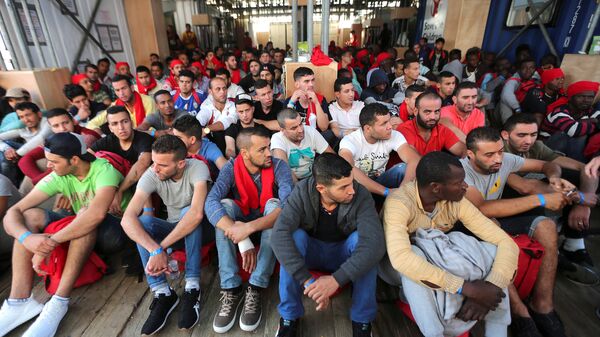Italy finally has a sworn-in government after months of deadlock. The new administration, formed as a result of a coalition between anti-establishment 5-Star Movement (M5S) and anti-immigrant right-wing League (Lega) parties, has a vocal anti-immigrant stance. New Interior Minister Matteo Salvini promised to stop the country from becoming "Europe’s refugee camp."
"Italy does not need a tougher policy but to keep governing migration in full respect of the international law and EU regulations. Italy has been generously saving lives at sea and protecting refugees and UNHCR welcomes the efforts of the new government to ensure that Italy remains a key international actor in respect and dissemination of human rights, non-discrimination and international protection," Fossi said.
READ MORE: Italy's Government Formally Takes Office
The UN official went on to stress that the UNHCR is ready to work in cooperation with the new Italian government to resettle migrants from Italy to third countries, reunify migrant families and protecting vulnerable migrants and refugees.
"UNHCR is ready to continue the constructive work done so far with the Italian government that allowed the implementation of important projects aiming at the protection of asylum-seekers and refugees, promotion of cooperation with countries of transit and origin of refugees, strengthening resettlement, family reunification and seeking other safe and legal pathways," he said.
READ MORE: Italy and Slovenia Could Change EU Migration Policy — Official
In summer 2017, Italy approved a plan to send naval boats to Libya in order to train the Libyan coastguard to intercept people smugglers and thus prevent illegal migrants from coming to Italy.
"As a result of the agreement between Italy and Libya in July 2017, sea arrivals to Italy have decreased by 77 percent compared to the same period last year: around 14,000 vs 61,000. Italy and Sicily are not a refugee camp. Refugees in the country are less than 0.3 percent of the Italian population, which makes around 3 refugees per 1,000 inhabitants," Fossi said.
Last week, Salvini traveled to Pozzalo in southern Sicily, a town on the migration front line, where he made it clear he is going to fulfill his pre-election promises on curbing migration. In particular, he aims to send back undocumented migrants and to cut funding for immigrants maintenance.
His remarks in Pozzalo came after over 50 migrants drowned in the Mediterranean off the Libyan coast.
"The Mediterranean route is particularly deadly, making the need to maintain the capacity of rescue at sea operations all the more vital … In the first 6 months of 2018, over 700 people have died in the Mediterranean Sea. Saving lives at sea remains a top priority," Fossi said.
Under the current EU laws, member states have the right to send undocumented migrants back to their first country of entry to the European Union, which puts significant pressure on Italy and Greece.



